Field Education: Learning with Community Impact
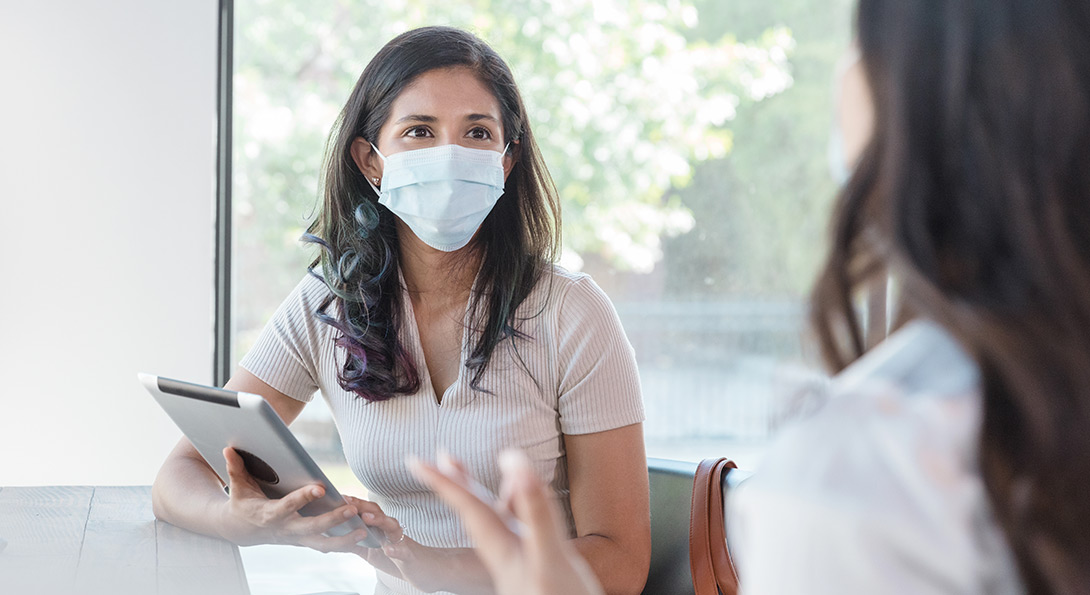
JACSW’s new Director of Field Instruction and the Field Liaisons reflect on the importance of partnerships with and service to marginalized communities, as well as the challenges and changes that the COVID-19 pandemic brought to field education.
The Council on Social Work Education describes field instruction as the “signature pedagogy” in social work education. Pamela Brown, JACSW’s new Director of Field Instruction, is fond of telling MSW students, “that’s a fancy way of saying that the best way of learning is by doing, through the actual practice of social work in the field.”
Despite the intended humor in her remark, field education is something Brown takes very seriously, and she conveys that seriousness to students. “I tell them that field placements are not a dress rehearsal. Real people are coming to you with real problems and real issues,” she says. “They need your assistance, and they are asking you to help them address those issues as a social worker. You are learning on the front lines of serving marginalized communities.”
According to Brown, the beauty of field education lies in its union of pedagogy with service to vulnerable populations, through the integration of knowledge and theory from the classroom with the real-world experience of providing needed social services. “Field education represents a real and functional partnership between the College and the agencies and organizations in the community,” she says, “and I think the benefits of those partnerships flow to everyone involved: the students, the organizations, and the College.”
Meet JACSW’s New Director of Field Instruction
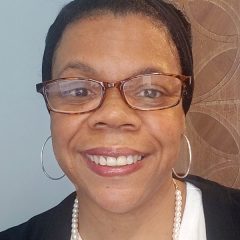
Pamela R. Brown, MSW, LCSW, is a proud JACSW alumnus and graduated with her MSW in 2002. With a focus on children, adolescents, and their families, she has over 15 years of experience as a social worker in schools, community mental health organizations, and residential facilities.
After graduating from JACSW, Pamela was strongly motivated to combine her interest in education with social work practice, and returned to the College as a field liaison. Building upon that foundation, she accepted the position of BSW Field Coordinator at Governors State University, and was subsequently promoted to the position of Director of Field Education. In the summer of 2021, upon the retirement of JACSW’s former Director of Field Instruction, Barbara Coats, Pamela again returned to her alma mater to apply her accumulated knowledge and expertise in that role.
Community Partnerships, Community Impact
Brown feels fortunate that there are practitioners who are willing to serve as field instructors, helping educate students and introduce them to the profession and practice of social work. “In turn, though, many have told me that it is a symbiotic relationship,” she says. “They often gain new knowledge and best practices from the students, who are sharing the knowledge they’ve received at the university. This can have a long-lasting impact in the community.
The College’s field liaisons have heard similar sentiments from field instructors. Carol Taylor says she is often told how much the field instructors appreciate hearing what MSW students are learning in the classroom. “They love hearing about how things have changed since they got their MSW, new theories, and new ways of thinking about things,” she says. Kimberly Jenkins agrees, adding, “It is a reciprocal relationship. The field instructors are relating their skills and experience to the students, while the students bring new information back to the field.”
Catherine Melka says the reciprocal benefits extend to staff and faculty in the College. “Having students in the field helps us stay current with what’s happening on the ground, what practitioners are facing in their agencies; perhaps funding challenges, or changes to Medicaid we may not be aware of,” she says. “It helps us better serve our students and our community partners.”
quote 1
It is essential for the field division to maintain strong partnerships with agencies that are working in communities, providing services to the people who live there. The benefits of the partnerships flow to everyone involved.”
| Director of Field Instruction
article continues
“Plus, it’s beneficial to the university for us to have our name out there in the community with really great students,” says liaison Nereida Rosales. “It is common to hear from people in agencies and organizations that they really like our students, their passion and dedication. The agencies know the Jane Addams name, but they also know the quality of students and the quality of work attached to that name.”
“For all of these reasons, it is essential for the field division to maintain strong partnerships with agencies that are working in communities, providing services to the people who live there,” Brown says. “The benefits of the partnerships flow to everyone involved.”
Challenges During the Pandemic
The COVID-19 pandemic presented new and unique challenges for classroom education, and the challenges were not any less so for education in the field. Given the unique combination of people involved – JACSW students and staff, and the agencies and their clients – field division staff and field instructors were tasked with coordinating placements that would meet the needs of the agencies and their clients while providing a sound educational experience for students, all while maintaining health and safety for everyone.
Brown says that one of the first things she did as incoming director was to meet with the field liaisons to talk about the challenges they faced during the pandemic, and she reports that the challenges were very similar to what she had seen in her previous position as Director of Field Education at Governors State.
“I think the main challenge, especially in the beginning of the pandemic, was the uncertainty among some of our partners as to how they would meet the needs of clients in a remote fashion. They were struggling with that themselves, and then trying to incorporate students into the process created a further challenge,” she says. “But everyone collaborated, including our students, and we’ve navigated that very successfully. Plus, the agencies have become more adept at delivering remote or hybrid services.”
quote 2
The main challenge was the uncertainty among some of our partners as to how they would meet the needs of clients…then trying to incorporate students into the process created a further challenge”
| Director of Field Instruction
article continues
Field liaison Kimberly Jenkins focuses on field placements in schools, and she relates that there are special challenges to working remotely with young people. “Zoom sessions are very difficult for keeping youth engaged to begin with, and young people in schools were allowed to keep their camera off, which made it even harder to keep them engaged. It was also required that a school staff member be on the Zoom call with them, which introduced scheduling complications,” she says. “Plus, our MSW students often had to communicate with their young clients via email, which young people just don’t use. It has been very challenging.”
Carol Taylor adds that at some placement locations, including some hospitals, using Zoom for remote services introduced confidentiality concerns. “There were times when the MSW students were delivering services remotely, but were still required to do that on-site at the agency. There were many variables that had to be accommodated,”
she says.
“I think a big challenge for many of our students was the isolation. They were in remote classes, and some of them had fully remote placements, and some of them lived alone,” says liaison Catherine Melka. “I could see some of them struggling with the isolation, and it was important for us to be aware of that and to be supportive.”
The Future of Field Education at JACSW
As the new director of field instruction, Brown has been at JACSW for only a short time, but she is already thinking about priorities and possibilities for the future. “I want to look at the landscape of our community partnerships, and where they are geographically in Chicago. There may be opportunities to expand partnerships to help serve marginalized communities on the South and West Sides. Examining that will be a priority,” she says.
Another of her goals is to encourage students to look at social work through a wider lens. Brown has observed that students often have a narrow focus in their placements, seeing only the one-to-one micro level practice. But she wants to make sure students can see the many other roles that a social worker can play. Reflecting on her own experience as an MSW student, she says she was unaware of the broad possibilities that were available. “For example, I did not realize there would be opportunity for me to write a Social Emotional Learning curriculum, or work with partnerships in schools and at my agency, and to provide services on that larger level,” she says. “In seeing these possibilities, students don’t have to choose what they want to do right now, but they should understand the different roles and possibilities that lie before them in their careers, and the different levels on which they can contribute to social change.”
quote 3
There will be greater opportunities for students to explore the intersection of social work and public health, and opportunities to bring greater health and well-being into marginalized communities.”
| Director of Field Instruction
article continues
Brown also understands the lasting impact the pandemic will have on the delivery of services, and therefore on the experience of field education. “I think ultimately these are changes for the better. Even prior to the pandemic, I was intrigued by the prospect of delivering services remotely, looking at how that works, what that looks like,” she says. “The pandemic was sort of a crash course, but we will continue exploring this, investigating and researching practical aspects of implementing remote services, as well as how effective they can be.”
She adds that JACSW has a history of looking at social work within a framework of public health, and thinks that the pandemic has brought even greater collaboration between the two. “There will be greater opportunities for students to explore that intersection,” she says enthusiastically. “And opportunities to bring greater health and well-being into marginalized communities.”
Meet the JACSW Field Liaisons
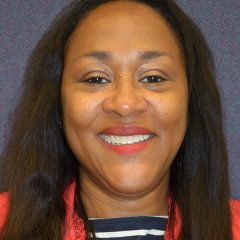
Kimberly Jenkins, MSW
What is your favorite thing about being a field liaison?
It’s meeting the students that come through the program, and in the various specializations. I’m able to share my experience with them and actually see them along their journey until they graduate, and that’s very rewarding for me.
What do you hope students get out of their field placements?
Sometimes students have a specific idea of what their placement will be, and it may not happen that way during their first year. So I hope that students are taking the field experience that they have and learning from it.
I often tell them that even though it might not have been their idealized experience, years down the line they will look back and see the skills they gained.
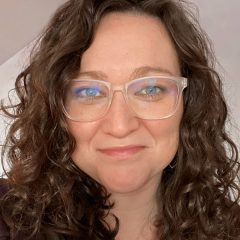
Catherine Melka, MSW, LCSW
What is your favorite thing about being a field liaison?
I love working with the students, I love their excitement and enthusiasm. There’s so much to learn in social work, and I love seeing the different perspectives of the students. They come in with so many different experiences. It’s really fulfilling to be part of those journeys.
What do you hope students get out of their field placements?
I hope they feel that they have gained the skills to begin their career as a professional social worker. I don’t expect anyone to be a master at the end of their internship, but I hope they feel prepared with the basic skills of how to engage with people, how to work with people, and how to think critically about whatever it is they are doing.
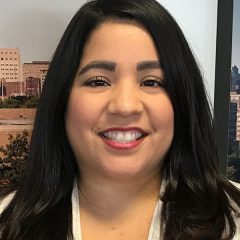
Nereida Rosales, MSW, LCSW
What is your favorite thing about being a field liaison?
I love being out in the community, learning about different organizations and seeing students’ excitement in their placements. It could be their first experience with what social work really is, and how social workers apply their knowledge to the particular population, the ethnicity, or the culture of the community.
What do you hope students get out of their field placements?
I hope students have an open mind about the experience and understand that field education is not a cookie cutter experience. You can read about it in a book, you can read an organization’s mission statement, or you can Google it and make all sorts of assumptions, but it’s not until you are doing the work that you understand what the community, the population, or an organization is really about.
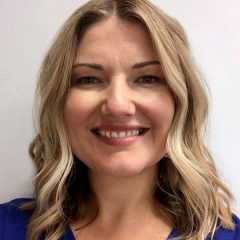
Carol Taylor, MSW, LCSW
What is your favorite thing about being a field liaison?
I really enjoy mentoring the students as they work toward becoming professional social workers, and working with them in becoming their “best selves”. That was my favorite part when I was a field instructor, working with young or new social workers, seeing their eagerness to learn, and fulfilling their need for professional guidance.
What do you hope students get out of their field placements?
I hope they gain the skills to be able to practice, not only engagement and assessment, but the professional development of becoming a better practitioner, with a better understanding of how things work in the real world. That’s the whole point of field education!